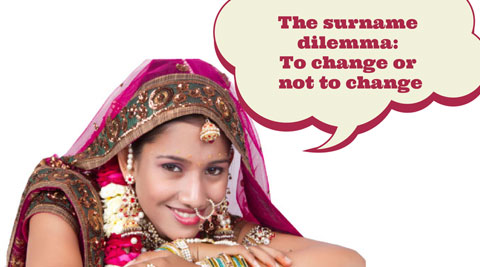http://indianexpress.com/article/lifestyle/the-tricky-issue-of-womens-surnames/
Written by Leher Kala | Mumbai | June 30, 2014 3:31 pm

According to a Government Resolution issued by the Women and Child Welfare Department (WCWD) recently, women in Maharashtra will now have the option of using either their fathers’ or husbands’ names in all official documents. Children can now mention names of both parents, or remove the father’s completely if they choose.
Written by Leher Kala | Mumbai | June 30, 2014 3:31 pm
SUMMARY
Fifty years after the feminist movement took off in the West, we’re still grappling with the problem of married versus maiden names.

According to a Government Resolution issued by the Women and Child Welfare Department (WCWD) recently, women in Maharashtra will now have the option of using either their fathers’ or husbands’ names in all official documents. Children can now mention names of both parents, or remove the father’s completely if they choose.
I guess it would be too much to expect the WCWD to consider that some women may prefer to drop both, their father’s and husband’s names, and choose a new, random one. It’s not a bad idea to create an option for that as well. The fact that the husband’s name is no longer a requirement should be celebrated, it was an aggravating reminder that the state believes wives are the property of husbands. Fifty years after the feminist movement took off in the West, we’re still grappling with the problem of married versus maiden names and pondering the eternal question: why choose?
Changing your name for a woman should be entirely a matter of choice, not compulsion or expectation that it usually is in Indian families. It should be appreciated for being as much a romantic leap of faith as marriage. It’s not about feminism but about something that’s been fundamental to your existence for over 20 years, your identity—-which you’re suddenly taking a huge chance on for no conceivable benefit, unless you’re marrying a Gandhi or Kennedy.
I like short, swift names with little fuss. But I like convenience best and I couldn’t imagine going through the effort of changing my name on my passport, driving licence, credit cards and so on. In the same spirit, I have no objection to being called by my married name as well. Officially, according to law, we’re all supposed to conduct business and file taxes under one name only. The trend currently for newly married, educated women in India are three excruciatingly long, clumsy and unwieldy, sometimes-hyphenated names.
Interestingly, in a survey conducted among American college students, only 10 per cent agreed that “a woman keeping her name was less committed to her marriage”, an unspoken view that I suspect holds prevalence in India. People don’t get how the rules have altered, if only subtly. Women are marrying later everywhere, after they’re well established in the working world. Often they’re making significant contributions to the family kitty, as well as carrying the additional responsibility of bearing children.
In our heads, if not in reality, our names carry some equity, especially if we’re already well-entrenched in a career, say, like journalism. And in the era of social media, it’s not just journalists who are worried about bylines. There’s your digital identity to consider as well. Imagine the painstaking task of changing an e-mail ID, Facebook and Twitter profile names. The stakes, once again, are loaded against women: in case of a divorce, you have to go through the mortifying torture of changing your name back again.
In India, however, taking on a spouse’s name is not seen as retro or old fashioned but as a sign that you’re making more of an effort to be a couple. Even the most emancipated of men don’t wonder about this gender-biased tradition which has no real utility at all, other than a sense of family identity that can be created in so many other more significant ways. It’s the same reason people have extravagant weddings with flowery prose as vows —- it’s almost like the belief is if you do all that, it’s all it takes — and the marriage will work spectacularly. Giving up your own name is complicated at many levels, and unfortunately, it doesn’t come with a guarantee that everything will be alright.
No comments:
Post a Comment